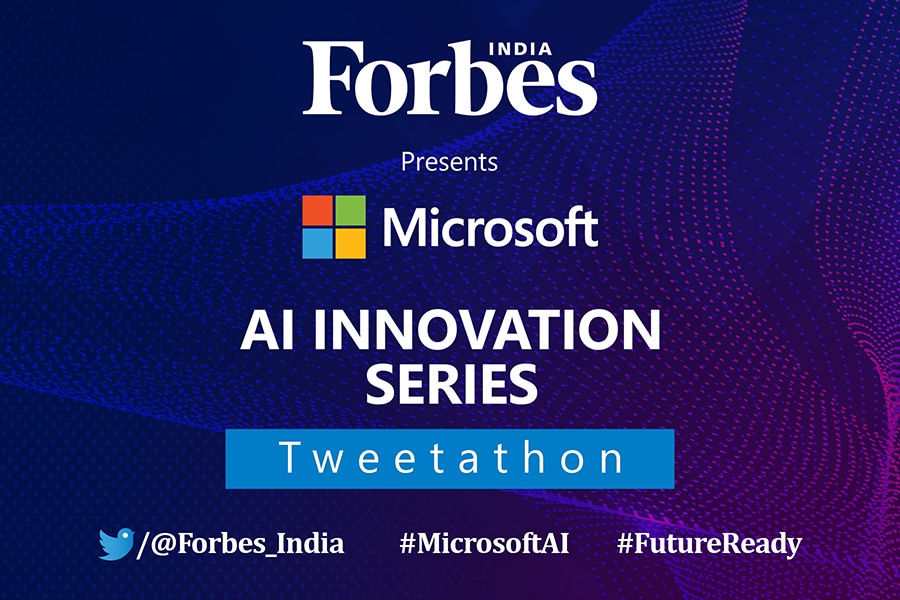Building tech-skilled talent to be future ready
Setting priorities for the new world of work



Over the past 18 months, every form of work environment has evolved. We live in a new world of work where we don’t have to be physically together to feel like we’re in it together. But this hybrid work is complex and has culminated in the “Hybrid Work Paradox", wherein people want the flexibility of remote work, and they also want the inspiration and ease of in-person. And, the only way for organizations to solve for this complexity is to embrace flexibility across their entire operating model, including the ways people work, the places they inhabit and how they approach business processes.
To explore how companies can become future ready, especially with respect to people-skilling and their need for hybrid work solutions, Forbes India hosted a tweetathon under the Microsoft AI innovation series, on 30th September 2021, themed ‘Building Tech-skilled talent to be Future Ready’.
The panel for the event comprised thought-leaders from the domain, including Sangeeta Gupta, Sr VP & Chief Strategy Officer, NASSCOM Maneesh Sharma, General Manager, GitHub India Bhuwan Lodha, Chief Digital Officer, Mahindra Group Balaraman Ravindran, Professor, Department of Computer Science and Engineering and the Mindtree Faculty Fellow, IIT Madras and Dr Rohini Srivathsa, National Technology Officer, Microsoft India. Moderated by Manu Balachandran, Assistant Editor at Forbes India, they tweeted their insights on the importance of training & skilling for tech and AI and what it means to be a future-ready enterprise.
Setting the context, Dr Rohini Srivathsa remarked that hybrid work is the future, and organisations require a new operating model across People, Places and Processes to be future-ready. “Every organization would be at different stages of evolution. It"s important to make decisions on the basis of inputs from different listening channels and then have a combination of people, place and process to support it," she added.
Being future-ready, according to Bhuwan Lodha, rests on having future-ready people. He commented that all companies will need to build and nurture talent that can work with new technologies, and in new ways. “Large companies like ours, will also need to upskill the workforce to be truly future ready!" he said, adding that the three key ingredients for future ready organisations were openness to new ideas, focus on upskilling and a holistic approach towards tech talent development.
Sangeeta Gupta concurred that the demand for tech talent is across industries - healthcare, financial services, retail, logistics, etc., and skills around data, AI, cybersecurity, cloud, customer experience and product management were most in demand. “The demand supply imbalance for digital talent will continue for some more time unless we can rapidly upskill our existing talent, implement the National Education Policy 2020 and focus on skilling at scale," she observed. “The good news is that this journey has already started."
As the discussion went deeper into how tech talent can be encouraged, Maneesh Sharma pointed out that tech brings about constant change, which culminates in constant learning. “Learning by doing is usually the best approach," he advised. He also suggested that there is a treasure trove of learning on the internet that tech and participating in open-source projects helps build skills as well as enables learning from developers from across the globe. He also noted that while Indian academia was supporting future tech talent to learn foundational skills that makes them future ready, there was a huge demand for tech talent as every company is fast becoming a software company.
In response Balaraman Ravindran remarked that there is no dearth of talent in India. “With the right exposure and training, there is a huge workforce (semi-urban/rural) waiting to make a difference and IIT Madras is hoping to enable that with some of our online programs, which typically came out of our conversations with our industry partners," he shared.
The discussion shifted to how cloud, data and AI (tech & tech skills) were powering the evolving future of hybrid work. With people working more flexible hours, they also need tools that support asynchronous collaboration, real-time meetings, ad hoc messaging, document collaboration, and business processes automation—all in a single organizing layer.
Within this evolving ecosystem, Microsoft India has adopted a collaborative approach on the talent and skilling agenda. The tech giant is strongly leaning in on data for its decision making as it embraces a Learn it All approach to shaping the future of its work preferences.
As an extension of its global skilling initiative, the company is working closely with the government, industry and civil society in India to help build digital resilience during this time of massive change.
The insightful tweetathon on ‘Building Tech-skilled talent to be Future Ready’ highlighted the increased significance of data, AI and digital technologies, alongside the need to enable and facilitate human talent in the new and changing work world. It offered clear takeaways about the importance of ensuring technical advancement to become future ready within the evolving hybrid work scenario.
The pages slugged ‘Brand Connect’ are equivalent to advertisements and are not written and produced by Forbes India journalists.
First Published: Sep 30, 2021, 22:09
Subscribe Now